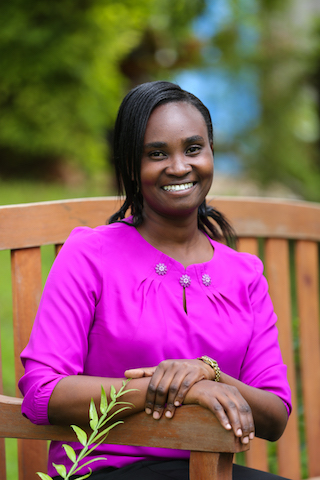Meet Edinah Song'oro, Molecular Geneticist and Mawazo Scholar
My Work Using Genomics to Study Antimicrobial Resistance in Kenya
By Edinah Song’oro
Mawazo Scholar Edinah Song'oro authored the following blog post on her research as part of the global DNA Day celebrations. Learn more about DNA Day and the ‘15 for 15’ Celebration here.
The science of genomics is the application of genetics and molecular biology towards studying genetic materials of organisms. The field of genomics is rapidly growing in Kenya with major applications in several fields. This includes research into drought-tolerant plants in agriculture and HIV vaccine development in medicine. A unique application of genomics in Kenya has been in efforts to stem wildlife poaching and trafficking. In this setting, molecular approaches are used to investigate semi-processed or physically indistinguishable wildlife products. For example, in my research I have used sequencing of Mitochondrial DNA (mtDNA) cells to identify wildlife species sold as bushmeat in rural markets using small samples taken from meat, skin and, blood stains. In addition, DNA barcoding has become a promising tool for rapid and accurate identification of wildlife and plant species in Kenya and in many other geographies.
Another important area of application is in the identification of resistant genes and their relationship to the environment. Antimicrobial resistance refers to the ability of microorganisms to develop resistance to antibacterial, antiviral, antiparasitic, and antifungal medications. This emergence of antimicrobial resistant genes in microorganisms is becoming a major global public and animal health issue. A major driver of this phenomenon is the increased use of microbial agents in a range of agricultural and medical applications, which in turn find their way into the environment. Regular exposure of humans and animals to these compounds may lead to transfer of antimicrobial genes to these populations, ultimately serving as reservoirs for resistant genes.
For several decades antimicrobial resistance has been a growing threat to the effective treatment of an ever-increasing range of infections caused by bacteria, parasites, viruses and fungi, making the treatment of patients difficult, costly, or even impossible. The impact on particularly vulnerable patients is most obvious, resulting in prolonged illness and increased mortality. The magnitude of this problem motivated me to carry out my doctoral research in this field, with a focus on determining the diversity of resistant genes in Nairobi and Naivasha Counties of Kenya. As a molecular geneticist, I use genomic tools to isolate antimicrobial resistant genes from various environmental samples such as soil, river water, and sewage, as the non-clinical environment is a vital factor in the propagation and dissemination of these genes. This research will increase our understanding of the relationship between resistance in the environment and the spread of antimicrobial resistance in human and animal populations. I will also sequence the resistant genes and generate a data map that will show antimicrobial resistance hotspots and areas of unique resistance genotypes. I also hope to communicate my research findings to local stakeholders and help find better ways to reduce the burden of infections that may be caused by environmental microorganisms.
ABOUT THE AUTHOR
Edinah Song'oro is a Tutorial Fellow and 2nd year Ph.D. student at Jomo Kenyatta University of Science and Technology’s Molecular Biology and Biotechnology department. Her dissertation research project is titled “Occurrence and dynamics of antimicrobial resistance genes in selected environments in Nairobi and Naivasha, Kenya.” She has academic and research experience in multiple biological disciplines including biotechnology, genetics, microbiology and molecular biology. As a female genomic scientist in Kenya, she hopes to encourage more women to enter the field of genomics and explore all its exciting opportunities.

